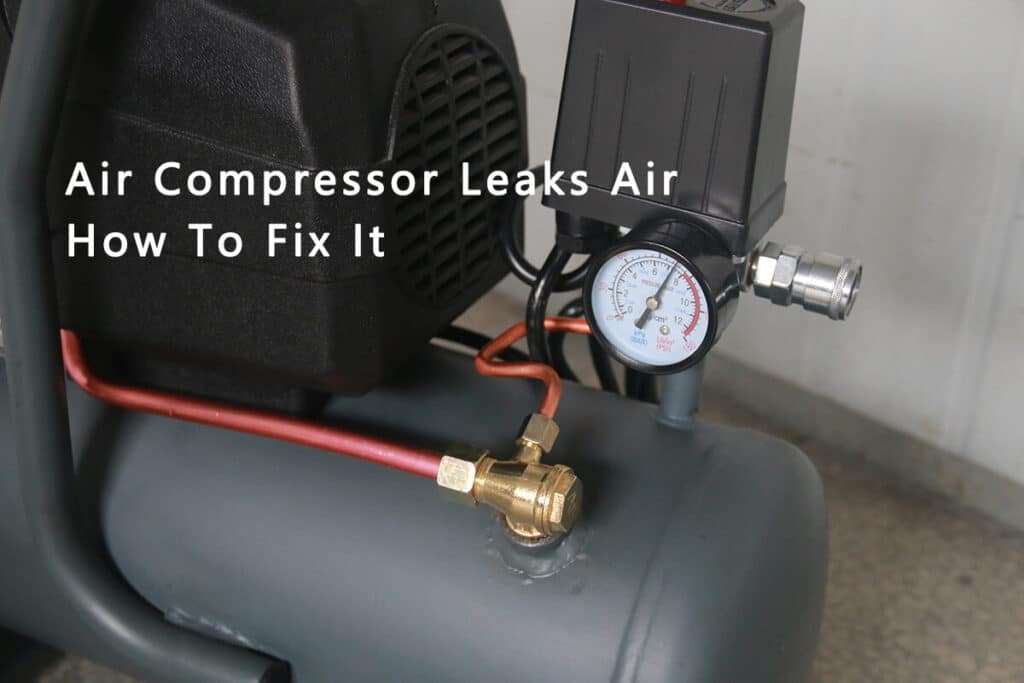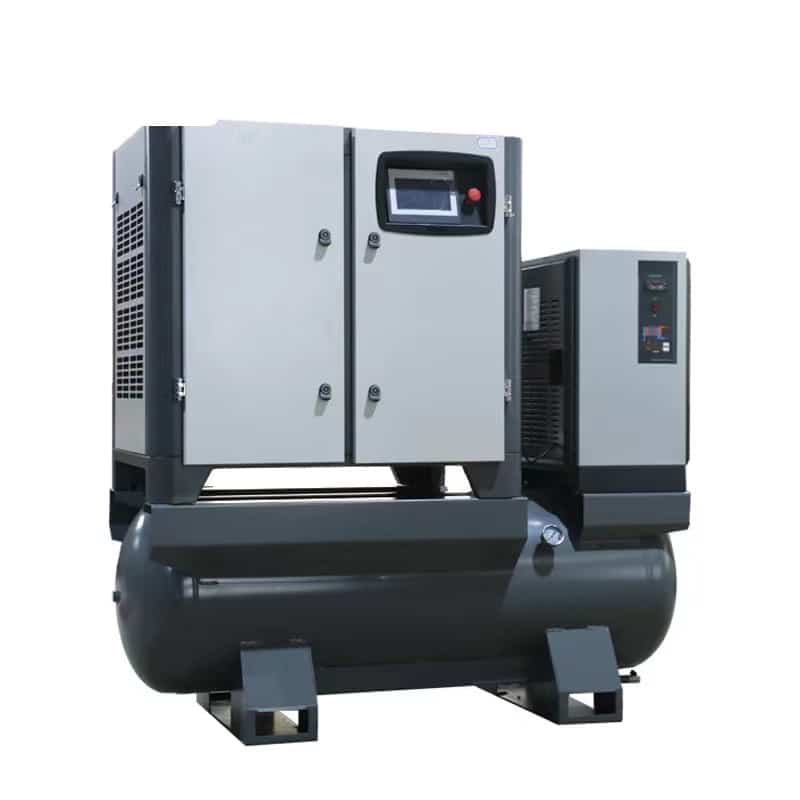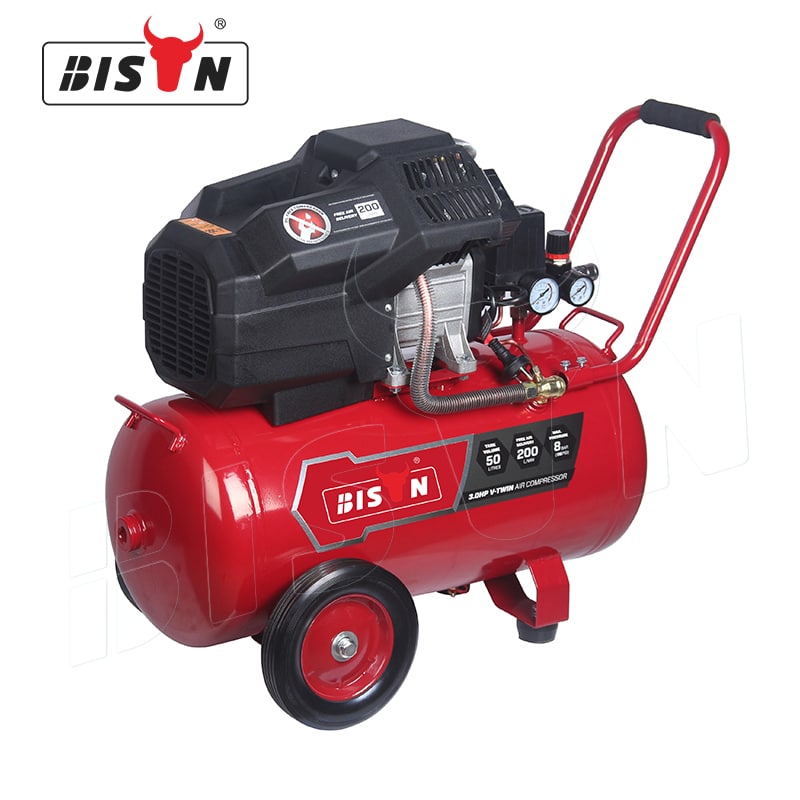एयर कंप्रेसर ब्लॉग
air compressor leaks air and how to fix it
- मार्च 21, 2023
If you hear a hissing sound from a component in your air compressor, you probably don’t realize how much damage it’s doing to your system. Air compressor leaks can be very costly, not only in terms of money but also in terms of productivity and efficiency.
Compressors consume a lot of energy. To produce 1 horsepower (HP) of compressed air power, around 7 to 8 horsepower (HP) of energy is needed. With such high energy demands and impacts, it’s crucial to keep your compressed air system operating at peak efficiency.
Knowing how to spot leaks in air compressors and how to fix and prevent them in the future can greatly benefit any company that regularly uses air compression systems. Read on for more information on finding, repairing, and preventing air compressor leaks.

Common leak problem areas
Leaks can occur throughout the air compressor – from the compressed air source to hoses and points of use. Even while it is crucial to focus on the entire system, some components need extra care. Some of the most common leak problem points include:
- Couplings, fittings, hoses, and tubes
- Control and shut-off valves
- Cylinder rod packing
- Leaky or clogged drains
- Filters, lubricators, and regulators
- Flanges
- Pipe joints
- Thread sealants
- Point of use devices
- Worn seals or gaskets
How to find air compressor leaks?
You can find leaks more effectively by listening carefully or using an ultrasonic leak detector. They can appear in your compressor system, and there are other ways to check specific components:
Air hose
Power off the compressor, unplug the cable, and lather some hand sanitiser along the hose. As soon as the system is running, check the soap for air bubbles to identify the air leak’s location.
Pipes
Metal pipes that connect parts of the air compressor system may also start leaking. Look for loose connections, rust, or cracks inside these pipes.
Drains and condensate collectors
Any loose parts or accumulation can be a sign of issues with air leaks. If they start to collect sludge or rust, maintain them and consider replacing them.
connector
Inspect each component for wear or any visible breakage in the seal. Connected devices are particularly vulnerable to leak problems.
How to repair an air compressor leak
Once a leak is identified, the next step is to fix it quickly. Start by checking the entire system to see if any leaks can be fixed by:
Tighten the connections
Anything that might be loose is where air might leak. If your leak occurs at locations such as air hose connections, couplings, seals, gaskets, or control or shutoff valves, you can fix the leak by tightening the connections.
Replacing or repairing parts
Some components may be repairable. If the rest of the assembly is still in good condition, see if the part can be repaired. It could be preferable or necessary to replace the part if it is outdated, harmed, or worn out.
Here’s how to repair leaks in various components of your air compressor system:
- Hoses and tubes: Replace leaking parts with new, well-fitted replacements.
- O-rings and valve seals: O-rings and valve seals that are worn or broken should be replaced, and make sure they both deliver outgoing air accordingly. Rubber components lose their effectiveness with time, heat, and pressure.
- Fasteners: Internally, the air compressor’s motor can become unstable if the screws are loose. Pay attention to these fasteners and tighten any shaky parts.
We have always seen that investing in higher-quality parts like fittings, pipes, hoses, and valves pays off. If you happen to be a distributor in the air compressor industry, you can check out BISON air compressor spare parts. These high-quality parts tend to experience fewer leaks and less downtime. Upgrading to premium parts can help reduce future air leaks and other maintenance issues.
How to prevent air compressor leaks
Taking preventive measures is a more cost-effective approach than constantly fixing leaks. Make a plan and stick to it. Make sure someone does regular leak audits and records them afterwards. Pay close attention to any potential trouble spots or worn-out parts.
Someone schedule leak repairs according to their air compressor service schedule. For example, let’s say you perform regular quarterly maintenance on your air compressor. You can then visit areas of past leaks and simultaneously identify and fix new leaks.
A good preventive maintenance approach should include the following:
- Identification: Regularly check for leaks and find their exact location. This inspection also includes flagging leaks.
- Repair: Use adequate methods to repair leaks that arise that will help prevent future leaks, such as higher quality parts.
- Verification: Test your system and make sure your leaks are followed up on and fixed.
Air compressor system leak maintenance
air compressor system leak repair is critical to avoid energy loss, improve efficiency, extend equipment life, and enhance safety. By investing in regular maintenance, you can save money, increase efficiency and keep your workplace safe. Here are the benefits of air compressor system leak repair:
Reduced downtime
Fixing leaks often comes with downtime, so You can prevent this and more significant issues from arising by doing preventative maintenance.
Increased efficiency
When you eliminate leaks, you increase the efficiency of your system, which allows tools to perform better because they receive the right amount of air pressure. You can complete tasks faster or easier, increasing your productivity.
Lower energy costs
In another form of efficiency, a well-functioning system uses all the electricity it absorbs more appropriately. Since your capacity is more efficient, you also don’t need to set it high, and you can reduce usage there. Minimizing unused air lost to leaks can save you significant utility costs.
पैसे बचाएं
With less downtime and repairs, your system can continue to operate, increasing your revenue. You may not have to pay for many expensive repairs, and you can reduce the time it takes to shut down the compressor while repairing leaks.
Increased reliability
In industrial facilities, downtime can cost you thousands of dollars. With a consistent leak maintenance schedule, you can keep your machines running and rely on them more than systems that keep crashing. You don’t have to worry about making repairs and more about running your plant.
Air compressors and parts from BISON
Spill prevention is a challenging task. But all that work is worth it when you consider how much these leaks will cost you.
We’ve already mentioned how high-quality parts can help. They require less maintenance, last longer, and provide better performance. BISON is your source for long-lasting air compressors and replacement parts for years to come.
frequently asked questions about air compressor leaks
How do I know if my car air compressor is leaking?
You can use the same techniques above to determine if your car's air compressor is leaking. When an air compressor leaks, you will only see insufficient pressure from the compressor.
Why do the water traps on the air compressor leak?
The water traps on air compressors only leak when the valve is not working properly. The valve is visibly damaged. If not, you should check that the valve is properly tightened or sealed.
Why is my compressor leaking air from the dipstick hole?
When the compressor leaks from the dipstick, it means there is a problem with the pump, not the dipstick. The dipstick cover has a hole to allow air to enter the oil pan.
But a piston seal in the pump cylinder keeps air out. However, if the seal has a problem, air will leak from the dipstick hole.
यदि आपके पास BISON एयर कंप्रेसर के बारे में कोई पूछताछ है, तो हम आपसे सुनना पसंद करेंगे।







